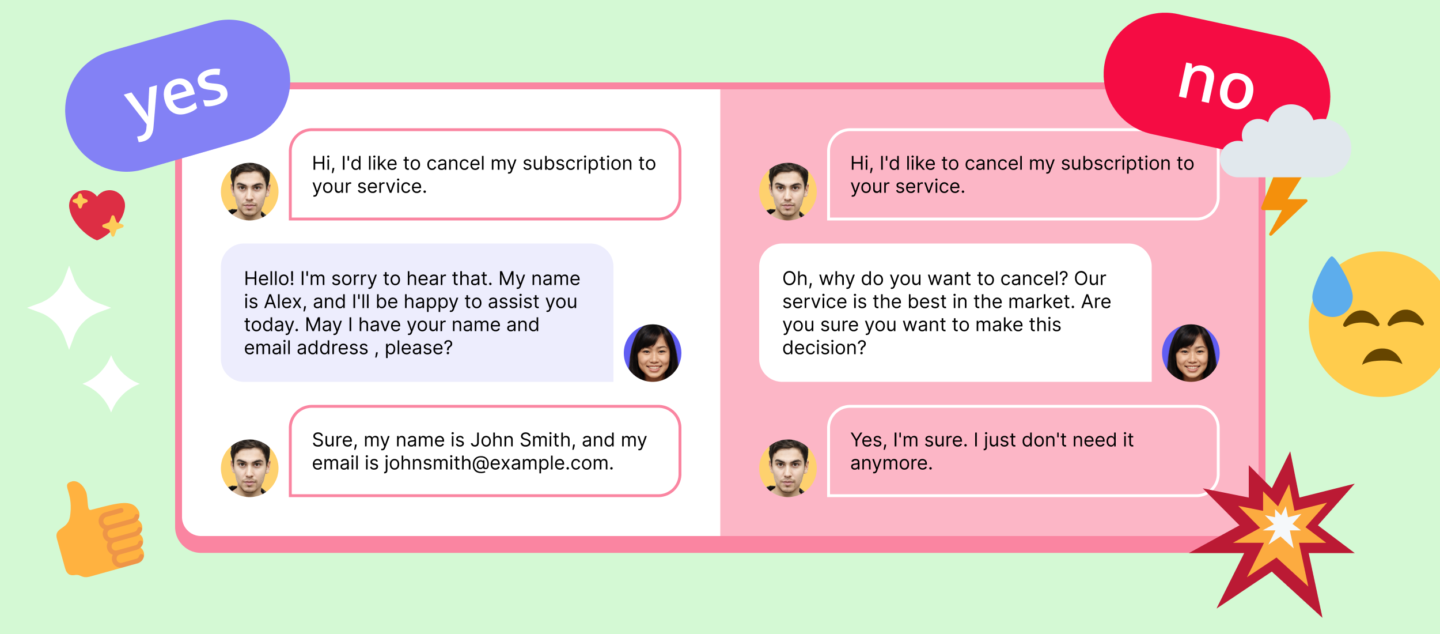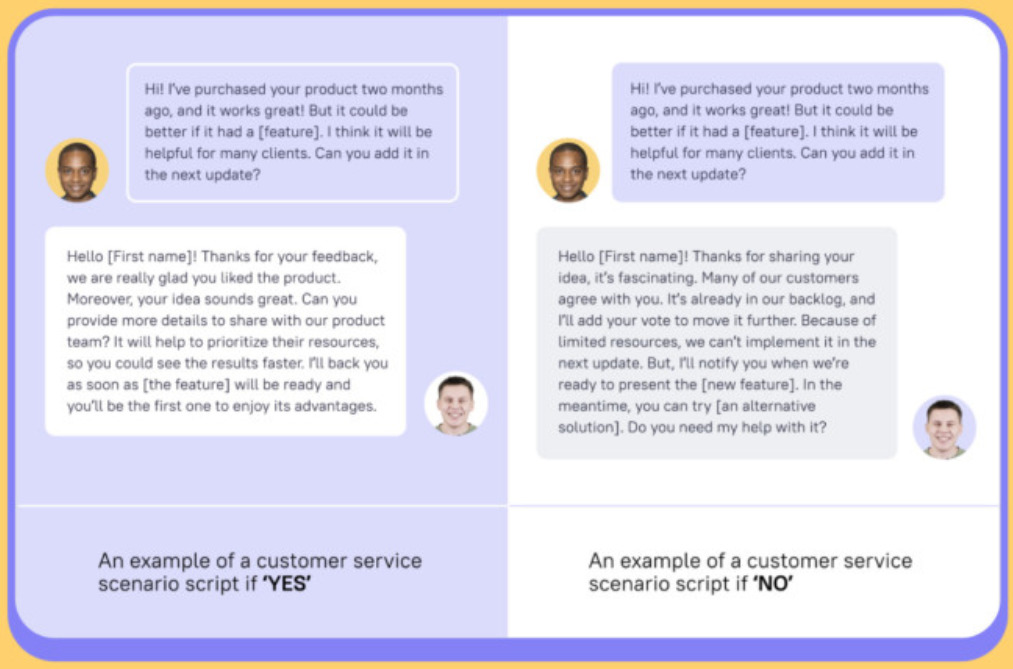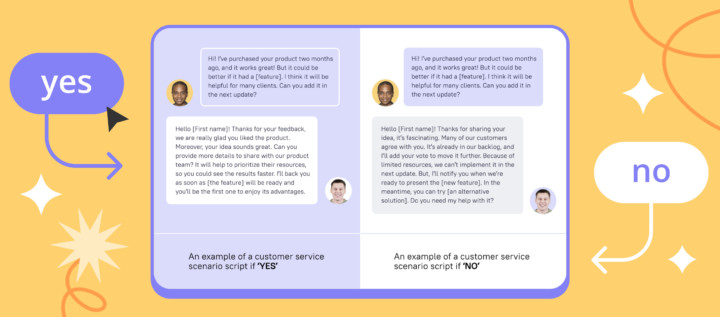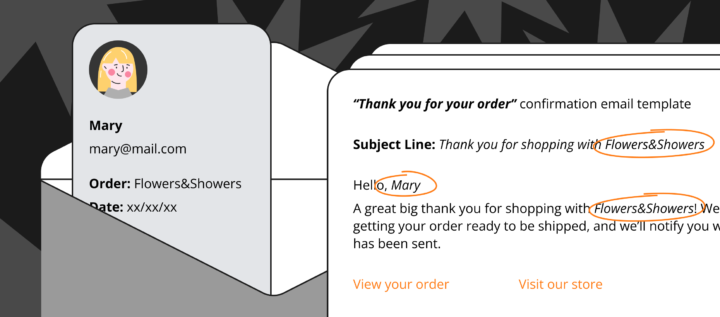Customer service cancellation script: TOP 5 scripts templates

Cancellation scripts serve as a crucial tool for customer service representatives (CSRs) when handling requests to discontinue a service or subscription. The goal of these scripts is to guide CSRs through the conversation, aiming to retain customers by addressing their concerns, offering incentives, or showcasing the value of the service.
However, it’s not all about retention. Cancellation scripts should also prioritize maintaining the customer’s trust and ensuring a smooth experience, even if they ultimately decide to leave.
In crafting an effective cancellation script, companies must strike a delicate balance between persuasive and empathetic communication. The right approach not only respects the customer’s autonomy but also leaves the door open for potential future business.
This article will provide insights for businesses to design cancellation scripts that optimize both customer satisfaction and retention, fostering a long-term, positive relationship with their clientele.
How would you respond to this cancellation request?
Customer: Hi, I’d like to cancel my subscription to your service.
Read also: 17 Zendesk alternative services and 13 live chat alternatives to try this year
Bad customer service response
CSR: Oh, why do you want to cancel? Our service is the best in the market. Are you sure you want to make this decision?
Customer: Yes, I’m sure. I just don’t need it anymore.
CSR: Well, you’re really missing out. Most of our customers are satisfied with our service. Maybe you’re not using it correctly. Have you tried all of our features?
Customer: I have, but I still want to cancel.
CSR: Honestly, I think you should reconsider. You won’t find a better service elsewhere. Give it another month, and I’m sure you’ll change your mind.
This is a bad example of handling a cancellation request for several reasons:
- The CSR immediately questions the customer’s decision to cancel and implies that they are making a mistake. This can make the customer feel invalidated and disrespected.
- The response comes off as defensive, insisting that their service is the best in the market. Instead of understanding the customer’s needs, the CSR is focused on defending the company’s reputation.
- The manager repeatedly pressures the customer to reconsider their decision instead of addressing their concerns or providing alternatives. This approach can make the customer feel uncomfortable and may damage the company’s relationship with them.
- There is no empathy or understanding for the customer’s situation. A manager doesn’t ask the customer for feedback or reasons for their decision, making it difficult to resolve the issue effectively.
Read also:
15 best lead generation services to grow your base in 2023
The 36 statistics on how chatbot for businesses grow your revenue in 2023
The secret weapon of your competitors or Why you should focus on customer service first
Good customer service response
CSR: Hello! I’m sorry to hear that you’d like to cancel your subscription. My name is Alex, and I’ll be happy to assist you with that today. May I have your name and email address associated with your account, please?
Customer: Sure, my name is John Smith, and my email is johnsmith@example.com.
CSR: Thank you, John. I’ve located your account. Before we proceed with the cancellation, may I ask the reason for your decision? We always appreciate feedback from our customers to help us improve our services.
Customer: I just find I’m not using the service enough to justify the cost.
CSR: I understand, John. Thank you for sharing your feedback. We’re always looking for ways to make our service more valuable for our customers. As a token of our appreciation for your time with us, I’d like to offer you a 30-day free access pass that you can use anytime within the next year if you ever decide to give our service another try. I’ll go ahead and process your cancellation now. Is there anything else I can assist you with?
Customer: No, that’s all. Thank you for your help.
CSR: You’re welcome, John. We’re sorry to see you go, but we appreciate your time with us. If you have any further questions or ever decide to come back, don’t hesitate to reach out. Have a great day!
Read also: 10 conversion rate optimization tools to enhance your funnel and boost revenue
Here is why it is a good example of handling a cancellation request:
- It includes interest and respect for the customer’s decision with no attempt to make them feel guilty or wrong.
- The manager asks for feedback to understand the customer’s needs better and identify potential areas of improvement for the company.
- There is a no-obligation offer as a token of appreciation, so the customer is under no obligation to continue using the service. This can leave a positive impression and potentially encourage future business.
- The CSR demonstrates empathy and understanding throughout the conversation, ensuring a smooth and positive experience for the customer during the cancellation process.
Deal with complicated customer queries like a pro with our playbook of 15 tricky customer service scenarios and ready-made answers 👇
Thanks! Now check your inbox

Best practices for dealing with cancellation requests
When handling customer service cancellations, it’s essential to strike a balance between empathy, professionalism, and persuasive communication.
Here are some tips and phrases to keep in mind:
Show genuine understanding and respect for the customer’s feelings and decisions
When a customer expresses dissatisfaction or a decision to cancel, approach it with empathy. Acknowledge their feelings and offer reassurance. A customer service script can guide the conversation effectively, ensuring that each response is thoughtful and supportive.
Listening actively and paraphrasing their concerns can make the customer feel heard and valued. You can also refer to pre-written scripts to ensure consistency in your tone and responses.
Phrases to Use:
- “I understand how you feel.”
- “I’m sorry to hear that our service hasn’t met your expectations.”
- “Thank you for sharing your concerns with us.”
- “We appreciate the opportunity to address any challenges you’ve faced.”
Pay attention to the customer’s needs
Make sure to ask insightful questions to understand why they’re canceling. This not only helps with customer retention but also provides valuable insights for service improvement. Use scripts or script templates to streamline this process and ensure that you address all relevant aspects of the cancellation.
Expert Tip: Use a cancellation email or script to gather customer feedback and understand why they want to cancel. This feedback can help improve the service or inform retention strategies.
Questions to Ask:
- “Could you please share the reasons for your cancellation?”
- “What specific aspects of our service were not working for you?”
- “Is there anything we could have done differently to better meet your needs?”
- “Would you like us to follow up with solutions based on your feedback?”
Present alternative solutions or incentives without pressuring the customer
Offering alternatives or incentives is a delicate balance—ensure the customer feels in control, not pressured. Present solutions that are relevant to their concerns. This can be guided by a well-prepared call script that ensures you offer the right retention offers.
“Let me assist you in exploring how our new update might be more aligned with your needs.”
Expert Tip: Personalize your alternatives using scripts or script templates. If a customer has a pricing concern, offer a more affordable plan. If they’re not using all features, suggest features that may better suit their needs.
Phrases to Use:
- “We have a more affordable plan that might better suit your needs.”
- “Before you go, we’d like to offer you a special discount for the next three months.”
- “Would you like to try our service with a new set of features before making a final decision?”
Read also: Customer engagement strategy template to create omnichannel campaigns
Be courteous, responsive, and respectful throughout the conversation
Every interaction, even a cancellation request, is an opportunity to demonstrate professionalism and care. Stay polite and responsive, making sure the customer feels valued, no matter their decision. You can always refer to a customer service script to keep the conversation smooth and ensure no vital points are missed.
Ensure you don’t leave any issue unresolved. Acknowledge their concerns fully, and keep your promises for follow-up actions.
Phrases to Use:
- “I appreciate your feedback, and I’ll make sure to share it with our team.”
- “Your satisfaction is important to us, so we’ll do our best to address any issues you’ve experienced.”
- “If you ever decide to return in the future, we’d be more than happy to assist you.”
- “I’ll ensure that your request is processed promptly and smoothly.”
Keep the conversation positive and ensure a smooth cancellation process
Even if the customer has decided to cancel, leave them with a positive impression of your brand. This can lead to possible re-engagement and brand advocacy in the future. A well-crafted service script ensures the customer’s exit is as smooth and courteous as possible.
Make sure the cancellation process is easy and transparent. A hassle-free cancellation enhances customer trust and leaves the door open for potential return customers. Document your interactions, and make sure the cancellation request is handled professionally, whether by phone or email.
Phrases to Use:
- “We’re sad to see you go, but we appreciate the time you spent with us.”
- “If you ever need assistance or have any questions in the future, please don’t hesitate to reach out.”
- “Thank you for giving us the opportunity to serve you, and we wish you all the best.”
- “Please let us know if you ever change your mind—we’d be happy to welcome you back!”
Additional Expert Customer Service Retention Strategies
To boost customer retention, consider implementing the following:
- Retention offers: Provide discounts or exclusive perks in your scripts for at-risk customers to encourage them to stay.
- Scheduling follow-up calls: If the customer isn’t ready to decide, offer to schedule a meeting or call at a later date to discuss further alternatives.
- Customer retention: Utilize retention strategies to re-engage with customers post-cancellation. Keep them on your mailing list, and send relevant offers or content that might appeal to them later.
By implementing these expert details and integrating scripts into your process, you can effectively handle cancellations, improve customer satisfaction, and enhance retention. With the right tools, including call scripts and script templates, you can ensure that even a customer choosing to cancel has a positive interaction with your brand.
Read also:
👉 Live Chat Best Practices: 20 Hacks to Make Customer Service Better
👉7 Best Live Chat for eCommerce: Boost Conversion on your Website
👉 Top 5 live chat mobile app: find the best fit for your business
👉 Live Chat: How Online Chat Tool Can Help Your Business
👉 20 Best Live Chat Software for your website chat service
FAQ
To handle a frustrated customer, use active listening and empathy. Acknowledge their frustration, ask probing questions to understand their concerns, and offer tailored solutions or retention offers without pressuring them. A call script can help ensure a professional and smooth conversation.
If the customer still chooses to cancel, respect their decision. Make the cancellation process as easy as possible, thank them for their time, and leave the door open for future re-engagement. Be sure to document the interaction and send a cancellation email confirming the process.
Cancellation surveys are a valuable tool for gathering insights into why customers cancel. By asking specific questions about their experience and offering solutions based on their feedback, you can adjust your retention strategies and improve your service for future customers.





